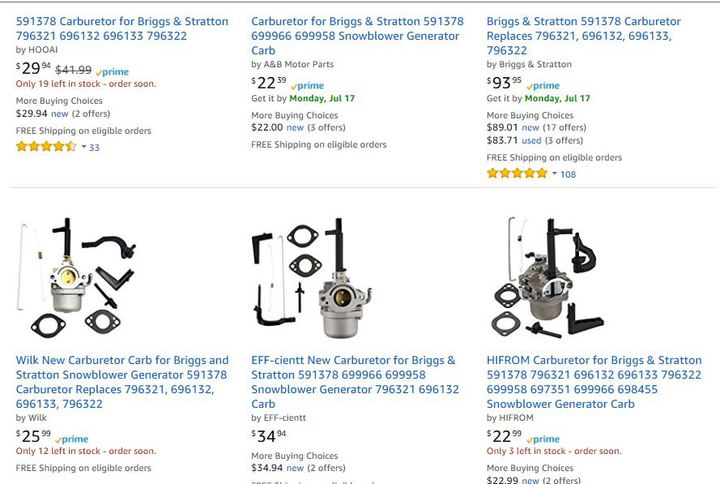john in la
Well-known Member
The carburetor on my generator needs to be rebuilt.
Needle valve is sticking.
Have put it off for months as it is not a item I need daily.
Couple of days ago a crew dug up some wires for street lights going into a subdivision up the road.
Knocked out power on our 3 mile dead end road.
SWMBO was not happy the generator would not work.
So facing a iron skillet up side my head I better get this done.
In talking to a small engine repair shop he said do not rebuild. Replace.
We never rebuild any more. To many come backs.
So I look at the B&S web site and they got the carburetor for $105. plus $5 shipping.
This is about the same price the repair shop gave me for a OEM part.
I have to assume B&S is having these parts made over seas and just rebadging them.
So what is the point of buying OEM parts.
Especially when you can go on amazon and find aftermarket parts for $23 to $35.

I do not see how a mom and pop repair shops that sell OEM parts can compete with this.
The price is so low $23 aftermarket compared to $110 OEM it almost makes you scared to buy them as they may be so cheap as not to work.
Needle valve is sticking.
Have put it off for months as it is not a item I need daily.
Couple of days ago a crew dug up some wires for street lights going into a subdivision up the road.
Knocked out power on our 3 mile dead end road.
SWMBO was not happy the generator would not work.
So facing a iron skillet up side my head I better get this done.
In talking to a small engine repair shop he said do not rebuild. Replace.
We never rebuild any more. To many come backs.
So I look at the B&S web site and they got the carburetor for $105. plus $5 shipping.
This is about the same price the repair shop gave me for a OEM part.
I have to assume B&S is having these parts made over seas and just rebadging them.
So what is the point of buying OEM parts.
Especially when you can go on amazon and find aftermarket parts for $23 to $35.

I do not see how a mom and pop repair shops that sell OEM parts can compete with this.
The price is so low $23 aftermarket compared to $110 OEM it almost makes you scared to buy them as they may be so cheap as not to work.

